Come Fly With Me: how did Walliams and Lucas's 'racist' Little Britain sequel get off the ground?
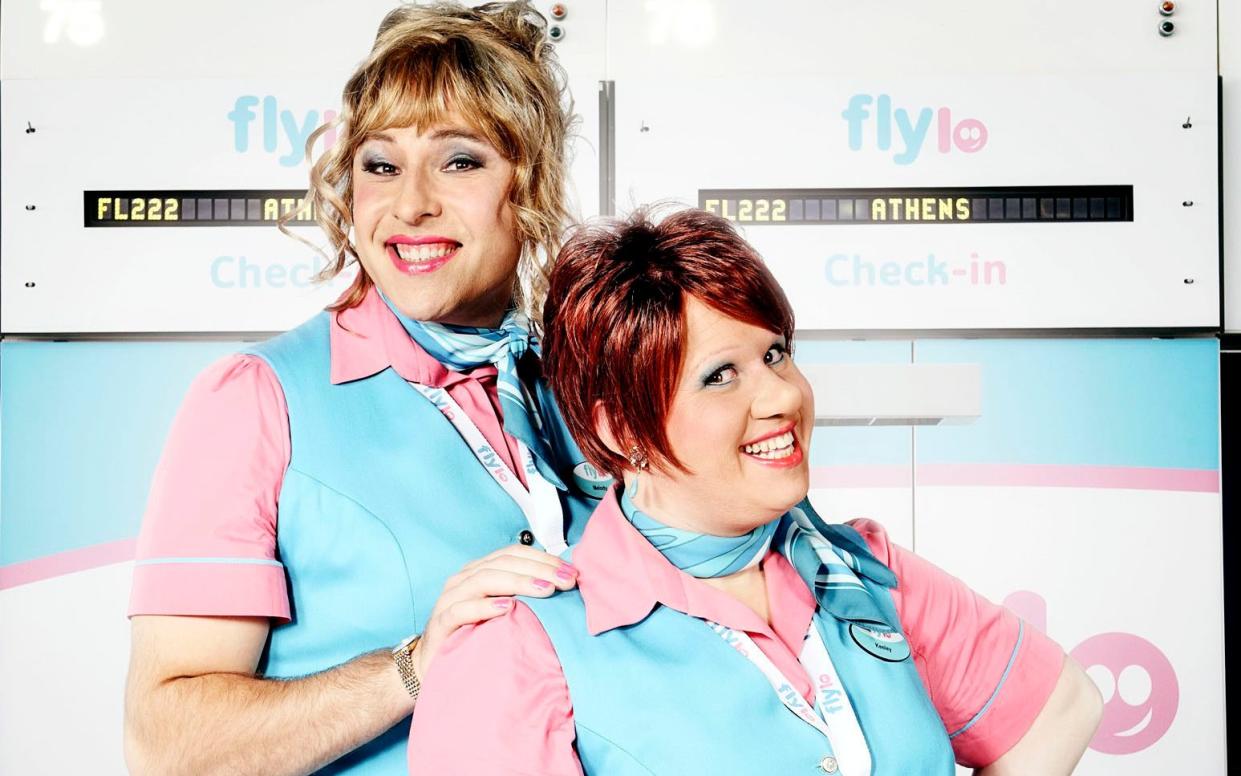
Little Britain had a brief radio reprise last October with the "Little Brexit" special, sparking yet more rumours of a return. In January, David Walliams even told The Sun that Little Britain would “definitely” be back. “I can’t say when exactly," he said. "But at the right time and place."
His prophecy came partly true in April, thanks to a largely well-received Little Britain revival as part of the BBC's Big Night In telethon. It was so well received, in fact, that the calls for a new series grew louder. But it now seems unlikely that Matt Lucas and David Walliams’s Little Britain will ever return.
Since the show was last broadcast, a pair of Christmas specials in 2006, Little Britain has been re-evaluated and criticised for its portrayal of gay, trans, and ethnic minority characters. This week – in wake of the Black Lives Matter protests and Leigh Francis’s apology for playing blackface characters – Little Britain has been removed from BBC iPlayer, BritBox, and Netflix.
A BBC Spokesperson told the Daily Mail: “There's a lot of historical programming available on BBC iPlayer, which we regularly review. Times have changed since Little Britain first aired so it is not currently available on BBC iPlayer.”
Netflix has also removed Lucas and Walliams’s follow-up sketch show, Come Fly with Me - which, in truth, was even more contentious.
The spoof airport documentary was controversial even at the time of broadcast in 2010. Now, with a decade of hindsight, it feels like something that belongs in the Seventies, with Lucas and Walliams playing as a cast of characters including painted-up racial stereotypes.
Among them was coffee kiosk manager Precious, a Jamaican woman (played by Lucas with blackface and a comedy West Indian accent) who’s too lazy to do a full day’s work and shouts “Praise the Lord!”; Taaj (Lucas), a deeply stupid ground crew worker of Pakistani descent, who ends each sentence with “Isn’t it” or “D’you get me?”; Moses (Walliams, also “tanned-up”), a camp executive passenger liaison; and dodgy Arab billionaire Omar Baba (Walliams in double-chinned disguise), owner of fictional budget airline Flylo, apparently based on easyjet founder Stelios Haji-Ioannou.
First broadcast on Christmas Day 2010, the debut episode of Come Fly with Me drew 10.3 million viewers – the third biggest TV audience of the day and most watched comedy of the year. But complaints came quickly. Twitter users soon likened Come Fly with Me to the “Black & White Minstrel Show” and accused it of stepping “clumsily over the line into overt racism.”
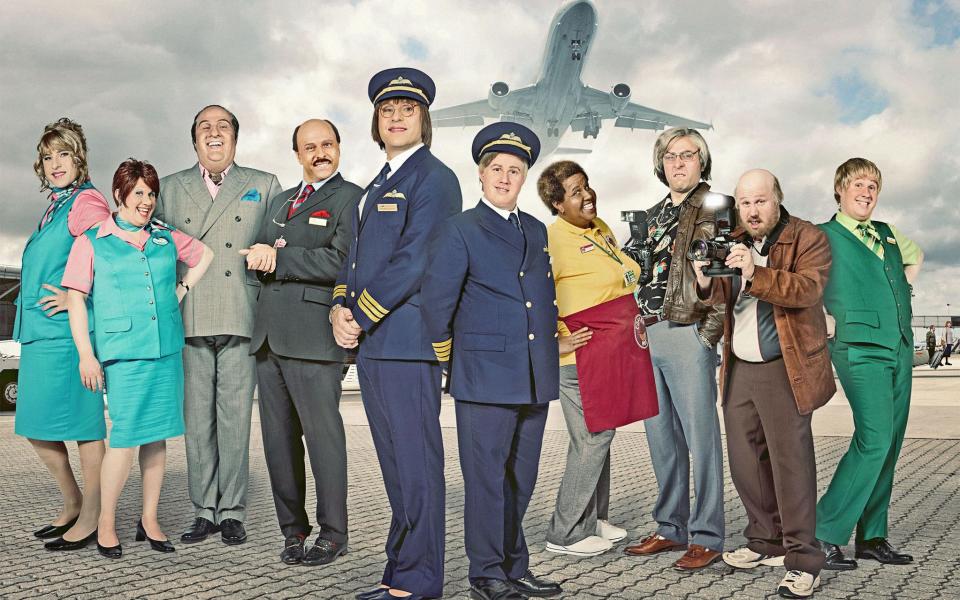
But the show had its supporters too. Jim Davidson, known for routines about his West Indian friend "Chalky", leapt to their defence in The Sun – probably not the ally Matt and David were hoping for.
Lucas appeared to disown the show when it was reported that he had “vetoed” a second series, despite being commissioned by the BBC. Lucas has since spoken about the well-meaning intentions behind the characters – and to his credit, with far more reflection and humility than the standard “it was a different time” defence. But for both stars, there’s no escaping the shameful history of Come Fly with Me.
Speaking together on a Come Fly with Me making of documentary, Lucas and Walliams recalled the show was an attempt to do something fresh, without the weight of Little Britain’s huge mainstream success. They brainstormed various ideas and formats.
“We had one idea,” said Lucas, “[about] a couple of actors, who had been in some sort of Seventies show together, that was now regarded as really un-PC. And they were going around America because they couldn’t get any work.” Nothing came of it.
From their various ideas, the BBC was keen to develop the airport doc concept. In spirit, it was very much like Little Britain – Lucas and Walliams as cartoonish characters, with sketches loosely threaded by running gags: passenger liaison Moses and his kids’ charity “Wish Wings”, using the proceeds to indulge in the gay scenes of various locations; a terminally stupid burger shop worker Tommy who’s trying to work his way up to pilot; two supposed best friends on the check-in desk who go to war over a promotion.
Unlike Little Britain, which began on Radio 4 and worked its way up through the channels until until it hit BBC One, Come Fly with Me landed on the prime Christmas Day slot. But Come Fly with Me was out-of-date straight off the runway. The mock-doc concept came 10 years after That Peter Kay Thing and The Office; far broader in its execution that those influential shows, Come Fly with Me's characters seemed troublingly out-of-step. Watched again in 2020 – and certainly after anti-racism protests and debates over the last few weeks – it’s inconceivable that the BBC would ever commission something like Come Fly with Me.
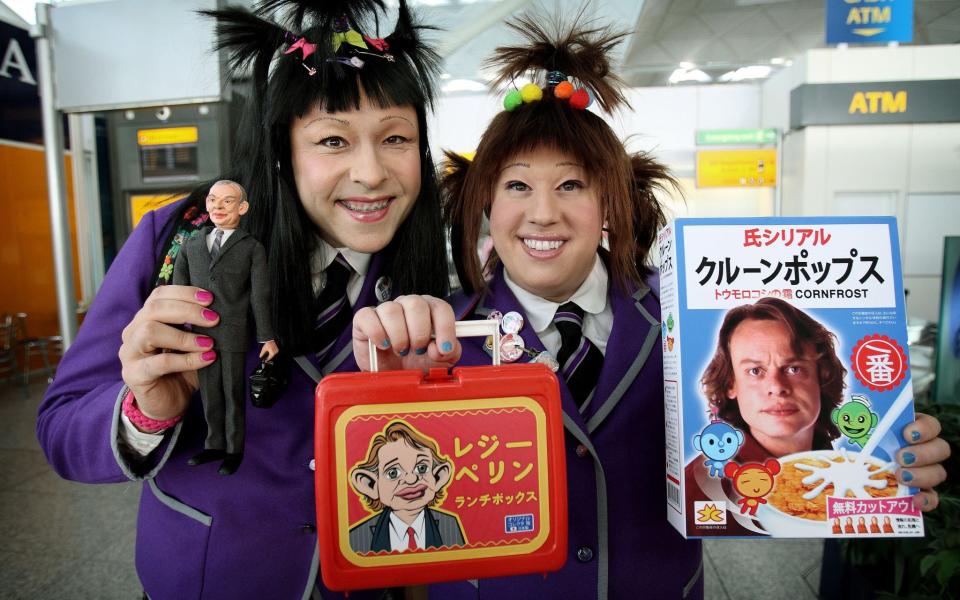
Now, of course, the concept of “offence” is thrown back and forth in the deafening, un-winnable shouting match between left and right, woke and alt-right. It's a time dominated by discourse about so-called cancel culture and the ever shifting parameters of what’s acceptable. Social media and industry voices demand representation for race, sexual orientation, gender identity – with appropriate actors cast in those roles – and every possible facet of art and interaction is examined for problematic subtext.
Jamie Oliver can’t rustle up some jerk chicken without a three-day Twitter firestorm about cultural appropriation – never mind Matt Lucas in a painted brown rubber mask, afro wig, and fat suit, shouting, “Praise the Lord!”
“We wrote that material, we played those characters,” Matt Lucas said on Richard Herring's Leicester Square Theatre Podcast. “But we weren’t asked the questions then that we would be asked now.”
Actually, Come Fly with Me is funnier that critics will admit. There’s a running joke about a couple who have “the holiday from hell” each episode – everything from finding their hotel isn’t properly built to being hijacked by pirates and kidnapped by a voodoo tribe – which taps into great British pastime of moaning; and the shoddily run budget airline, with flights delayed up to a year, is amusing, if depressingly real.
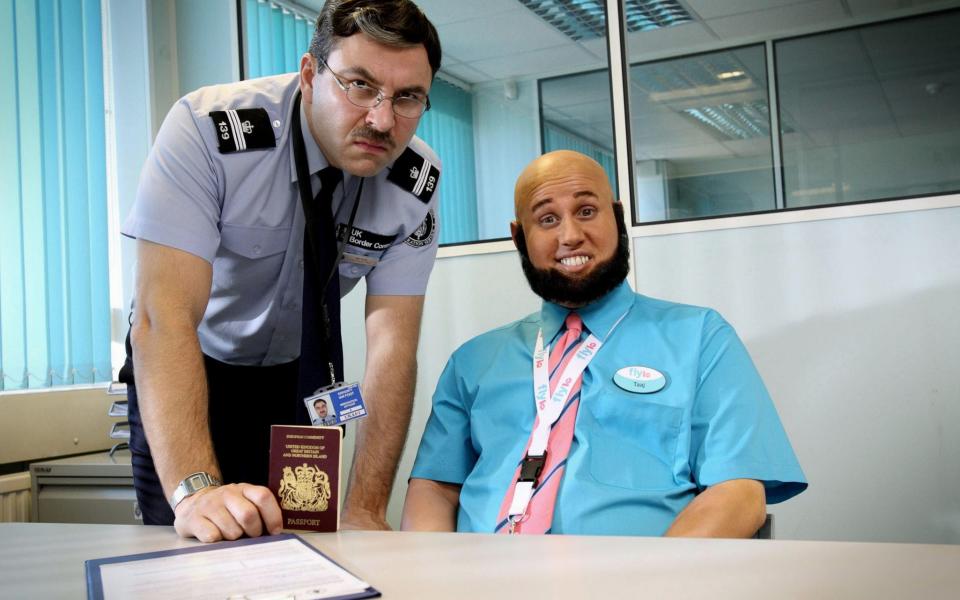
There’s also Irish airline steward Fearghal, who who resorts to underhanded tactics to win the “Air Steward of the Year” award and tries to seduce a straight colleague because, according to him, the only difference between a straight and bisexual man is two pints of lager (cut to them in a pub – “Another pint of lager?” asks Fearghal).
But at its worst, Come Fly with Me is deeply uncomfortable viewing. It’s difficult to imagine that the character of Precious was ever a good (or indeed, funny) idea; airline owner Omar Baba is like every stereotype about dodgy foreign businessmen rolled into one wobbly-chinned charlatan (Baba’s cost-cutting ranges from having no toilets on board to charging passengers for life jackets); and a scene in which Lucas and Walliams play Japanese teenage girls – in full East Asian prosthetics – is a throwback to decades-old depictions of “Oriental” characters.
Dwarves are also used for visual gags – part of a PR scam by Baba to make his planes look roomier – and David Schwimmer makes an unexpected cameo for a skit about trans porn. The show plummets to its offensive nadir with Moses – that’s Walliams painted up as a nondescript BAME character – speaking mock Chinese dialect to a “Chinaman”. Pardon the pun, as Moses says, but it just wouldn’t fly in 2020.
Asked about the issue of playing characters of different ethnicities on the making of documentary, Lucas said if it was a different concept – if they were just the writers, or it was an ensemble cast – they would have likely cast a 55-year-old black woman to play Precious. “But that’s not the concept of the show,” he said.
“I think it’s a hard one because there is a pleasure in seeing us dressed up,” said Walliams. “And there is something pleasurable about sometimes they are outrageous looks [...] where you go, ‘Oh my word, I can’t believe the make-up.’ But I think the character needs to be funny beyond its racial characteristics... all the characters we’ve created of different ethnicities, I think they’ve been comic characters not specifically to do with their race.”
The duo have form, of course. In Little Britain, which began on BBC Three in 2003, characters included Daffyd, the “only gay in the village”, which Lucas later learned was used as a taunt against gay kids in schools; Emily Howard, the overly masculine transvestite, who would be accused of being anti-trans now, while back in the mid-2000s, the trans community was, as Lucas has said, “invisible”; Desiree, a morbidly obese black woman (played by Walliams in blackface), seemingly played for laughs because, at a base level, she’s fat and black; and Thai bride Ting Tong. Writing in his 2017 autobiography Little Me, Matt Lucas also recalled being accused of “class tourism” for portraying characters such as Vicky Pollard, thick-headed Bristolian teenage mum.
Lucas has commented that the intention with both Little Britain and Come Fly with Me was to represent and celebrate multiculturalism in Britain – plus, on a shallower level, show off the range of characters they could play. “Fat, thin, tall, short, straight, gay, male, female, young, old," Lucas wrote in his book. "David and I saw playing different races as part of that.”
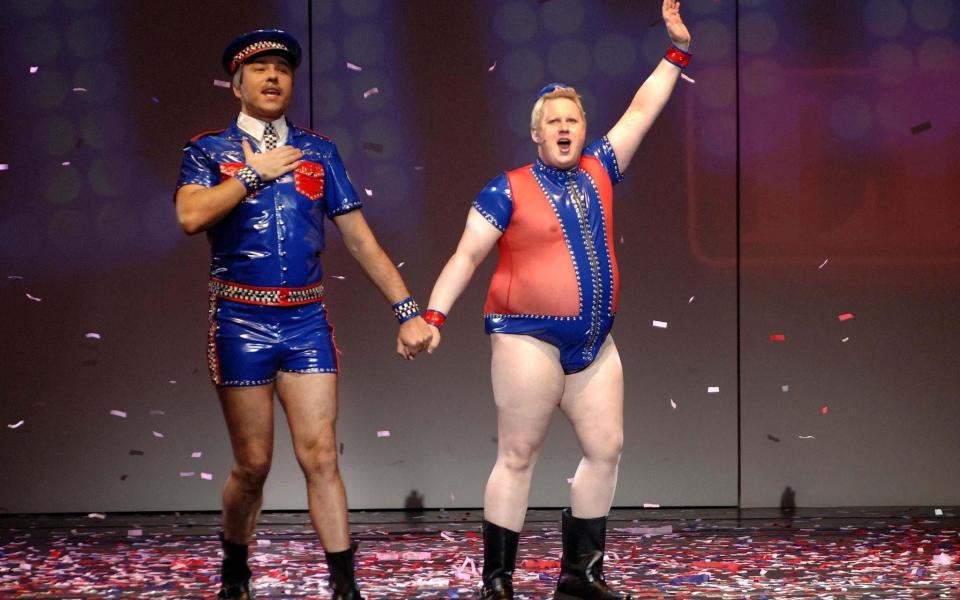
Lucas has admitted that Ting Tong was a mistake. “I thought we got the tone of those sketches wrong,” he wrote in Little Me, calling the execution “too rudimentary and insensitive”. “My performance was crude and simplistic and hard to defend,” he wrote. “I have a feeling that if we hadn’t spent all the time and money on those prosthetics we might have reviewed those sketches and cut them out of the show.”
Speaking to Richard Herring, Lucas recalled that growing up it was common to see white comedians gets laughs out of playing black characters.
“When I was a little kid I would see predominantly white people on television and they would often play black people," he said. "And there was a moment after that I felt I the late Eighties and Nineties where that didn’t happen, where people said, 'It’s wrong to make comedy out of the fact you’re a white person playing a black person, that is not acceptable for comedy.' When we were doing Little Britain and Come Fly Me it felt like things had gone somewhere else again after that.”
Lucas and Williams did belong to a generation of comedians who confronted controversial issues head on with irony and satire. Ricky Gervais – in The Office, the 11 O’Clock Show, and in his stand-up – used ironically offensive language. Father Ted put a lampshade on his head and pulled his eyes into slits. Alan Partridge boasted he was “homo-sceptic". And Ali G asked “Is it because I is black?” Comedians pushed the parameters of political correctness to prove they were in on joke – in fact, they made themselves the joke as a way of mocking prejudices. It was understood that they were so clearly liberal, it was all done in the same of satire.
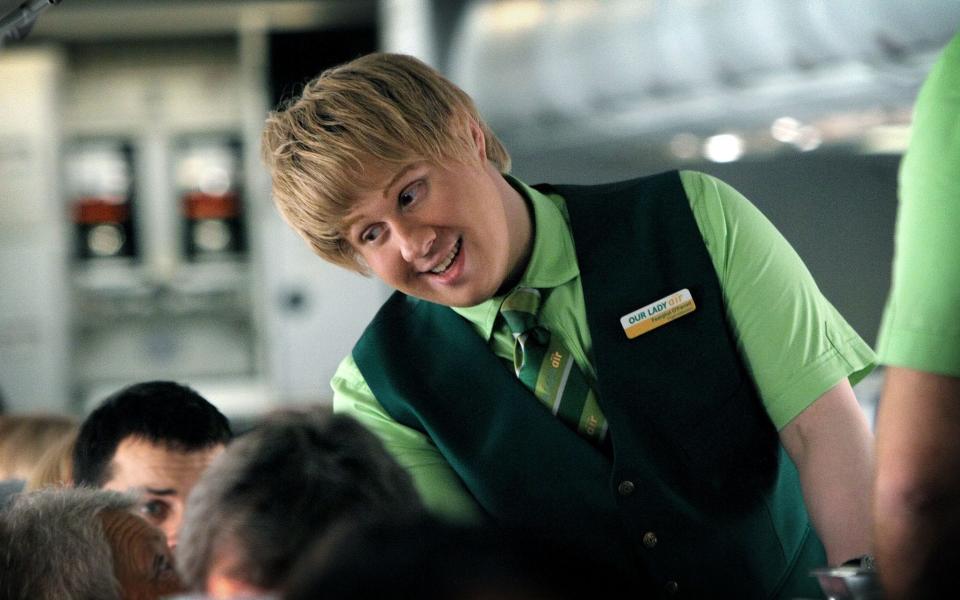
The same is true of Lucas and Walliams. According to Lucas, Little Britain characters Daffyd and Emily were intended as a celebration of queerness – and they sent up racist attitudes in Come Fly with Me through Walliams’s immigration officer Ian Foot, who’s suspicious of anyone foreign or non-white.
However, they seemed to think comedy had moved on so much that it was also “acceptable” to black-up if the intent wasn’t to mine laughs out of racism.
“I think if you’re accentuating racial characteristics for laughs you’re on dangerous ground,” said Walliams on the making of doc. “If you’re portraying someone from a different race it should be OK, you know, because it used to be people would black-up but they would make jokes very much at the expense of black people about their appearance and I think that’s now gone.
"And then time passed when no one did it. Now it seems acceptable. And in a sketch show it’s a little different. We wouldn’t do a whole series about two Japanese girls, it would be a bit odd, but I think for a couple of minutes it’s acceptable.”
It’s a staggeringly naïve attitude – or perhaps pure arrogance – and an attitude that can only come from a position of privilege, another concept that was much less discussed in 2010. Ten years after Come Fly with Me, there’s no way two successful white male performers could decide whether or not it’s fine to play different ethnicities.
While the first series of Little Britain was very good, it became as broad as it was successful in the following two series – they received the the kind of lowest common denominator backlash that Mrs Brown’s Boys faces now. Lucas and Walliams have arguably been the targets of some selective retrospective wokeness. Certainly, other comedians seem impervious to similar criticisms.
You rarely hear the universally-loved Vic and Bob being criticised for wearing blackface when they played Otis Redding and Marvin Gaye; or Harry Enfield for playing Greek stereotype Stavros and later Nelson Mandela; or Chris Morris, one of the left’s favourite comedy minds, performing ‘Uzi Lover’ while blacked-up in The Day Today; or national treasure Jim Royle for using homophobic slurs. Perhaps they’ll be among the next comics who have to atone for their problematic past.
Walliams was accused of racism again in 2017 for dressing as Kim Jong-un for Halloween. He’s also commented that he understands Little Britain would have to be different if it ever returned – as unlikely as that is now – but they'd still push boundaries.
I hear you. I've reflected and evolved. Waiting for THFC to do the same. https://t.co/07ZOxdgQJI
— Matt Lucas (@RealMattLucas) March 4, 2019
“It’s hard to say specifically how it would be different,” he told told the Radio Times. “There’s all kinds of tolerances that change. People understand people’s predicaments more now… I wouldn’t rule out anything because I basically think you have to be able to make jokes about everything, everyone. Otherwise there is no point having comedy.”
Though neither Lucas or Walliams has commented on Little Britain’s removal from streaming services so far, Matt Lucas has been apologetic and reflective. He is often seen on Twitter responding to accusations of racism by providing explanations and context.
Speaking to The Big Issue in 2017 about Little Britain, Lucas outlined what he would and wouldn’t do now. “I wouldn’t play black characters,” he said. “Basically, I wouldn’t make that show now. It would upset people. We made a more cruel kind of comedy than I’d do now. Society has moved on a lot since then, and my own views have evolved. There was no bad intent there – the only thing you could accuse us of was greed.
"We just wanted to show off about what a diverse bunch of people we could play. Now I think it’s lazy for white people to get a laugh just by playing black characters. My aim is to entertain, I don’t have any other agenda. And as I’ve got older, I’ve become more empathetic, I care more about hurting people.”
This piece is part of Screen Secrets, a regular series telling the stories behind film and TV's greatest hits – and most fascinating flops

